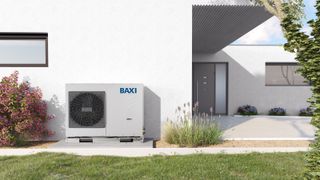Heat pumps 'three times more efficient than boilers'
Heat pumps performed well even on the coldest observed days, according to the UK government research

热泵可以用效率高,甚至经营in cold weather conditions — according to new research funded by the UK Government.
The Department for Energy Security and Net Zero’s Electrification of Heat Demonstration Project analysed the technical and practical feasibility ofair source heat pumps, as well as the potential pitfalls of a mass rollout into British homes.
The hope is that heat pumps will become a widely adopted alternative to traditional central heating and form a major part of the UK’s net-zero strategy.
Here's what the new government research discovered.
What are heat pumps?
Heat pumps move heat from one place to another using a compressor and a circulating structure of liquid or gas refrigerant to extract heat from outside sources and pump it indoors using electricity.
Air source heat pumps absorb heat from the outside air, whileground source heat pumpsuse pipes buried in the garden to extract heat from the ground.
However, concerns have been raised about the cost of installation and how suitable they are for some homes, especially considering the UK’s aging and energy-inefficient housing stock.
Some experts advise that heat pumps should only be installed in insulated buildings because the technology’s efficiency is higher when the flow temperature from the heat pump is lower. A heat pump in a poorly insulated building will cost more to run and have higher carbon emissions.
What did the government research look at?
A total of 742 heat pumps were installed into a broad spectrum of housing types and ages. These heat pumps are being monitored throughout the trial to assess their performance.
The analysis within the reports –Interim Insights from Heat Pump Performance DataandInterim Heat Pump Performance Data Analysis Report– found the median efficiency observed in air source heat pump systems during the project was 2.80 (280%).
The report states that this is a significant increase of around 0.3 to 0.4 (30-40%) since the Renewable Heat Premium Payment scheme (RHPP) heat pump trial was undertaken between 2011-2014.
It adds that while the average performance has improved, performance variation remains high. This suggests that progress is still required to improve the consistency ofinstalling an air source heat pumpand its design to support a large-scale rollout of heat pumps in existing homes.
Heat pumps shown to be three times as efficient
Marc Brown, business leader for homes at Energy Systems Catapult, said: “The interim findings of the Electrification of Heat Demonstration Project highlight just how far the industry has come in innovating to improve the performance and efficiency of heat pumps.
“With the release of this data, we can finally put to bed the notion that heat pumps do not work in cold weather conditions and that they are inefficient to run. We’ve observed the exact opposite. They are three times more efficient than gas boilers and work in cold weather conditions.
“While we’re taking steps in the right direction, we should not grow complacent. At the risk of sounding like a broken record, innovation and training are critical to the success of a mass rollout of heat pumps. We’ve done the hard work and demonstrated that heat pumps work – the UK is heat pump ready.”
How heat pumps performed well on coldest days
The researchers analysed the performance of heat pumps on some of the country’s coldest days (where mean daily temperatures fell to as low as -6oC) and found only a marginal decline in whole system performance.
The median ASHP system efficiency was 2.44 (or 244%) on the coldest days of the year. This result indicates that heat pumps continue to operate with high efficiency – providing the requisite heat to homes – in a wide range of property types even in cold weather conditions.
Commenting on the report, renewable energy expert Dr Jan Rosenow tweeted: “We often hear that heat pumps ‘do not work in old buildings’. Results indicate that there is no significant variation in performance based on house age. Note that this result should not be assumed to be indicative of the whole UK housing stock.
“Another claim often made is that ‘heat pumps don't work when it's cold’. On some of the country’s coldest days (where mean daily temperatures fell to as low as -6C) analysis found only a marginal decline in whole system performance. You can read more about 'do heat pumps work in cold weather' in our expert guide on the topic.
Get the Homebuilding & Renovating Newsletter
Bring your dream home to life with expert advice, how-to guides and design inspiration, direct to your inbox.
Sam is based in Coventry and has been a news reporter for nearly 20 years. His work has featured in the Mirror, The Sun, MailOnline, the Independent, and news outlets throughout the world. As a copywriter, he has written for clients as diverse as Saint-Gobain, Michelin, Halfords Autocentre, Great British Heating, and Irwin Industrial Tools. During the pandemic, he converted a van into a mini-camper and is currently planning to convert his shed into an office and Star Wars shrine.
Most Popular

BySam Webb
Thank you for signing up to Homebuilding. You will receive a verification email shortly.
There was a problem. Please refresh the page and try again.